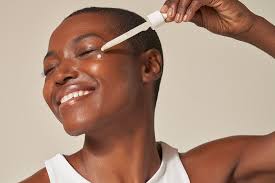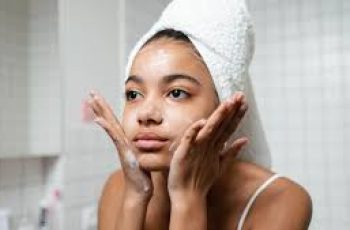
What Is Skin’s Microbiome And Why Does It Matter?
When most people hear the terms “good bacteria” or “probiotics,” they usually think about their gut health first.
However, similar to the gut, our skin has its own microbiome, which is often overlooked or unknown to many. This lack of awareness can lead to neglect of this vital ecosystem on our skin.
But what exactly is a microbiome? Is it really that important for skin health? And if so, how should you take care of yours? Don’t worry, we’re here to explain everything you need to know.
What Is Your Skin’s Microbiome?
The skin microbiome refers to the community of tiny organisms that live on your skin’s surface. This includes bacteria, viruses, and fungi, which together are called skin flora.
These microorganisms create a balanced ecosystem that plays a crucial role in maintaining the skin’s overall health and function.
The skin’s microbiome helps with tasks such as absorbing skincare products effectively and maintaining the skin’s appearance.
It’s fascinating to think about how billions of bacteria types and strains work together harmoniously most of the time.
This job is no simple task, especially since the skin is a challenging environment for microorganisms. The skin naturally has an acidic pH, which helps fight harmful bacteria.
Additionally, the skin produces sebum, an oily substance with antimicrobial properties, making it difficult for harmful microbes to thrive.
Despite this, the skin microbiome thrives, balancing the need to protect and maintain skin health.
Interestingly, the skin is “bilingual” in the sense that different parts can communicate with each other.
The bacteria on your skin can interact with your skin’s immune system, which in turn communicates with the bacteria in your gut.
This ongoing conversation between the skin and body is vital to maintaining balance, resulting in a healthy and happy microbiome.
What Does the Skin Microbiome Do?
The microbiome’s work is continuous—24 hours a day, 7 days a week. These microscopic organisms protect the skin from daily threats such as UV radiation, harmful bacteria, pollution, and free radicals.
Alongside fighting off unfriendly organisms, the microbiome helps manage the skin’s pH levels and delivers essential nutrients and skin lipids.
Moreover, the microbiome contributes to the skin’s protective barrier, which keeps skin healthy and balanced.
This barrier prevents moisture loss, defends against external irritants, and helps regulate immune responses.
In other words, the microbiome plays a vital role in keeping your skin strong, resilient, and looking its best. Without this protection, skin would be more prone to dryness, irritation, and damage.
Why Is Your Microbiome Important?
Your skin’s microbiome is essential for keeping your skin functioning correctly throughout the day.
Environmental factors like pollution and UV rays continuously target your face, causing damage over time. The skin microbiome helps repair this damage by supporting the skin’s natural healing process.
Damage to the skin may show up as dryness, dullness, and premature aging signs like fine lines and wrinkles.
Because the microbiome plays a critical role in protecting the skin, it is crucial to nurture and maintain it.
If the skin flora becomes imbalanced or damaged, skin conditions such as eczema or dermatitis may develop.
These conditions often manifest as dry, itchy, and uncomfortable patches, worsened by everyday stressors and environmental aggressors.
How Can I Restore My Skin Microbiome?
The skin’s microbiome thrives in an acidic environment, which helps maintain its protective functions. However, many factors can damage this delicate balance, including:
Harsh soaps and cleansers
Aggressive skincare products
Environmental pollutants and climate factors
Overuse or misuse of antibiotics
Fortunately, there are several simple ways to help restore and maintain your skin’s microbiome.
Don’t Over-Cleanse
A consistent skincare routine is essential for healthy skin, but over-cleansing can do more harm than good.
Using harsh cleansers or scrubs too frequently can strip the skin of its beneficial microbes. This makes it easier for harmful pathogens to invade and cause problems.
Also, drying your skin too much can weaken its barrier. Instead, gently pat your skin dry with a soft towel, avoiding vigorous rubbing.
Choose Your Products Wisely
Not all skincare products are microbiome-friendly. For example, antibacterial soaps can destroy the natural balance of microbes on your skin.
Many moisturizers contain ingredients that might irritate or harm the microbiome as well. Instead, opt for gentle, fragrance-free formulas that contain hydrating ingredients like hyaluronic acid.
This helps lock in moisture and supports the skin’s protective barrier, enabling the microbiome to function optimally.
Products containing probiotics can be especially beneficial. Probiotics help nourish good bacteria on the skin and reinforce its natural defenses.
If you want to learn more about how probiotics benefit your skin, there are many resources and blog posts dedicated to this topic.
Don’t Be Afraid of Bacteria
The idea of bacteria living on your skin might sound scary, especially since we have been told for years to eliminate bacteria. However, many bacteria are essential for your skin’s health.
Over-sanitizing can remove both harmful and beneficial microbes, leading to imbalances.
Embrace the microbiome by encouraging the good bacteria to stay on your skin through nourishing ingredients and a balanced skincare routine.
Maintain a Healthy Diet
What you eat can have a big impact on your skin’s microbiome. A diet rich in vegetables, proteins, and healthy fats supports a healthy gut, which in turn influences the skin’s ecosystem.
Staying hydrated by drinking plenty of water throughout the day is also crucial. Dehydration is one of the main threats to the skin microbiome, making your skin vulnerable to damage.
How Can I Protect My Skin’s Microbiome?
Protecting your skin microbiome is about building habits that support its natural balance. Incorporating the following steps into your daily routine will help you maintain healthy skin flora:
Use a broad-spectrum SPF 30 or higher every day, regardless of weather conditions.
Always remove makeup thoroughly before going to bed to prevent buildup that can disturb the microbiome.
Choose skincare products suited for your skin type to avoid irritation and reactions.
Look for products containing probiotics or other nourishing ingredients that protect and support your skin bacteria.
By following these guidelines, you will help your skin microbiome thrive, keeping your skin healthy, resilient, and glowing.
In Conclusion
It’s amazing to realize that our skin hosts hundreds of thousands of bacterial strains, all playing a vital role in our skin’s health.
Despite being largely unknown to many, the skin microbiome deserves our attention and care.
Now that you understand its importance, you can make informed choices to nurture and protect this incredible ecosystem. Remember, not all bacteria are bad—many are essential allies for your skin.
So go ahead and spread the word: bacteria aren’t the enemy after all!


